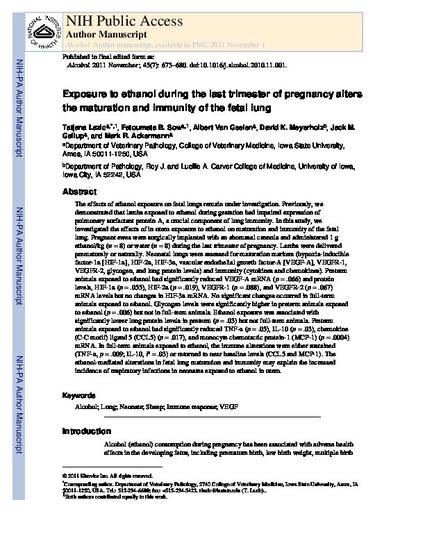
Article
Exposure to ethanol during the last trimester of pregnancy alters the maturation and immunity of the fetal lung
Alcohol
Document Type
Article
Disciplines
Publication Date
11-1-2011
DOI
10.1016/j.alcohol.2010.11.001
Abstract
The effects of ethanol exposure on fetal lungs remain under investigation. Previously, we demonstrated that lambs exposed to ethanol during gestation had impaired expression of pulmonary surfactant protein A, a crucial component of lung immunity. In this study, we investigated the effects of in utero exposure to ethanol on maturation and immunity of the fetal lung. Pregnant ewes were surgically implanted with an abomasal cannula and administered 1 g ethanol/kg (n = 8) or water (n = 8) during the last trimester of pregnancy. Lambs were delivered prematurely or naturally. Neonatal lungs were assessed for maturation markers (hypoxia-inducible factor-1α [HIF-1α], HIF-2α, HIF-3α, vascular endothelial growth factor-A [VEGF-A], VEGFR-1, VEGFR-2, glycogen, and lung protein levels) and immunity (cytokines and chemokines). Preterm animals exposed to ethanol had significantly reduced VEGF-A mRNA (p = .066) and protein levels, HIF-1α (p = .055), HIF-2α (p = .019), VEGFR-1 (p = .088), and VEGFR-2 (p = .067) mRNA levels but no changes in HIF-3α mRNA. No significant changes occurred in full-term animals exposed to ethanol. Glycogen levels were significantly higher in preterm animals exposed to ethanol (p = .006) but not in full-term animals. Ethanol exposure was associated with significantly lower lung protein levels in preterm (p = .03) but not full-term animals. Preterm animals exposed to ethanol had significantly reduced TNF-α (p = .05), IL-10 (p = .03), chemokine (C-C motif) ligand 5 (CCL5) (p = .017), and monocyte chemotactic protein-1 (MCP-1) (p = .0004) mRNA. In full-term animals exposed to ethanol, the immune alterations were either sustained (TNF-α, p = .009; IL-10, P = .03) or returned to near baseline levels (CCL5 and MCP-1). The ethanol-mediated alterations in fetal lung maturation and immunity may explain the increased incidence of respiratory infections in neonates exposed to ethanol in utero.
Copyright Owner
Elsevier, Inc.
Copyright Date
2011
Language
en
File Format
application/pdf
Citation Information
Tatjana Lazic, Fatoumata B. Sow, Albert G. Van Geelen, David K. Meyerholz, et al.. "Exposure to ethanol during the last trimester of pregnancy alters the maturation and immunity of the fetal lung" Alcohol Vol. 45 Iss. 7 (2011) p. 673 - 680 Available at: http://works.bepress.com/jack_gallup/28/

This is an author's accepted manuscript of an article from Alcohol 45, no. 7 (November 2011): 673–680, doi:10.1016/j.alcohol.2010.11.001.